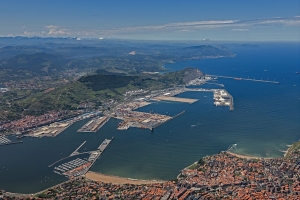


(Posted on 15/03/24)
The Port of Bilbao has hosted a meeting organised by the business agency of the Netherlands, with representatives from the Netherlands, Germany and the Basque Country. The aim of the meeting was to make further progress towards the development of an intra-European corridor for green hydrogen linking the three territories. Among those attending from the Netherlands and Germany were representatives from their respective embassies, the ports of Amsterdam and Duisport, the Chamber of Commerce and businessmen from both countries. The Basque delegation was led by the Basque Government itself, represented by Arantxa Tapia, Minister of Economic Development, Sustainability and the Environment, and by representatives from Basque Trade and Investment, the Basque Energy Agency, companies such as Petronor-Repsol and Iberdrola, and the Port Authority of Bilbao, which also hosted the event.
In the middle of the Bay of Biscay, equidistant between Brest and Finisterre, the Port of Bilbao is central in the European Atlantic. For almost 700 years, this central location has made Bilbao an important link with the main ports in both the American continent and the north of Europe.
The meeting included a visit around the facilities of the port of Bilbao and an analysis of the port infrastructure required to take forward the effective production, transport and logistics of green hydrogen and its contribution to decarbonisation, with a view to achieving net zero emissions.
The event was held within the framework of the Memorandum of Understanding (MoU), signed on 13 June 2023, in the field of hydrogen between the Port of Bilbao and the Port of Amsterdam, and subsequently extended to include the Port of Duisport, in Germany. The agreement provides for hydrogen produced in the Basque Country to be supplied to key industrial consumers in the Rhine-Ruhr region. In this respect, the fundamental role of the Dutch hydrogen ecosystem in distributing green hydrogen and synfuels produced in the Iberian Peninsula to the Dutch and German markets is to be highlighted.
The Port of Bilbao works with all classes of goods and vessels. It is open and operative 24 hours a day, every day of the year. It has no problems of drafts or tides.
The Port’s influence stretches to the Iberian Peninsula and into the south of France – a vast area whose epicentre is in the metropolitan area of Bilbao. Within a 200-kilometre radius 4 million people live, and more than 20 million within 400. In addition, it is an excellent route on the way to the eastern European market.
Abu Dhabi based AD Ports Group, a global enabler of integrated trade, transport, industry, and logistics... Read more
This year marks a significant milestone in maritime innovation as Port Hedland, Australia, celebrates... Read more
Associated British Ports (ABP), the UK’s leading port operator, has announced the latest tranche... Read more
During the Investment, Labour, and Trade Promotion Programme in Japan (November 16–22, 2025),... Read more
AD Ports Group subsidiary Khalifa Economic Zones Abu Dhabi - KEZAD Group, the largest operator of integrated... Read more
Abu Dhabi based AD Ports Group, a global enabler of integrated trade, transport, industry, and logistics... Read more
Peel Ports Group has achieved a 48% reduction in operational greenhouse gas emissions in the last five... Read more
The Trois-Rivières Port Authority (TRPA) in Canada has announced the appointment of Mr. Anick... Read more
Euroports commitment to continuously improving operational efficiency, enhancing workplace safety, and... Read more
Under the slogan ‘Your Intermodal Link Between China, Iberia and the Atlantic Markets,’... Read more